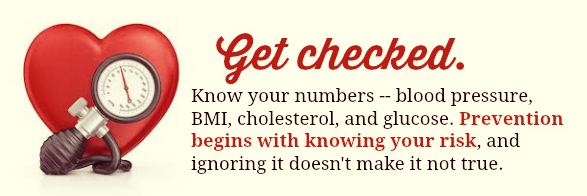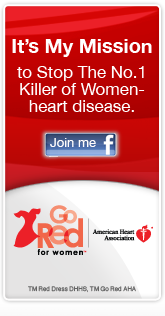Earlier this month I shared nine ways you can Go Red during American Heart Month and make a difference for yourself and others. This series will provide more information and resources on each of them. Today’s post: Get checked.

Carolyn Thomas is an influential heart disease blogger and speaker, and one of the first heart sisters I found online after my heart attack. When Carolyn speaks to women about heart disease, she asks everyone these questions (a device I’ve adopted when I speak as well):
How many of you here know your BMI — your body mass index? (a few hands)
How many know your lipid profile — your cholesterol numbers? (surprisingly few)
How about blood pressure? (a few more, usually the most)
How many of you know what you weighed when you graduated high school? (If a group of women, virtually all)
There are laughs and rueful chuckles until the punchline is delivered — which numbers are really the most important?
I have little patience with willful ignorance of risk factors (just as I do for “being embarrassed” as the reason someone doesn’t seek care). I’ve done this survivor/writer/speaker thing long enough and heard enough stories to just be over that. I get it, I do, but ladies, we need to get beyond it. We need to take control of our health and care. No one else is going to do it for us.
By now you may have heard me say a few times — 80 percent of cardiac events could have been prevented. That means 8 out of 10 women can avoid an illness like mine through prevention, and prevention begins with knowledge.
Here are the big six risk factors for heart disease, the ones most highly correlated to heart events:
Smoking
You don’t need a test to find out if you do that. If you do, stop. Now. If you are a woman, smoking carries a greater risk of heart disease than it does for men.
Diabetes
Again, you probably know if you have this, but one-third of Americans with diabetes are undiagnosed. That’s why you should get your glucose levels tested.
High blood pressure
The one test almost everybody has every time they see a doctor. Which is good, because it is a big deal. High pressure puts lots of strain on the heart and arteries and over time can cause damage.
High cholesterol
Specifically high levels of “bad” cholesterol (LDLs), high triglycerides, and low “good” cholesterol (HDLs). Find out your lipid profile and ratios, not just your total number. Make sure it is a fasting test to get accurate results.
Overweight or obese
That’s why the BMI number is important.
Physical inactivity
No test here, but I’m guessing you know where you stand.
And women, here are a few more risk factors for you; it is important that you know them and discuss them with your doctor (who may or may not have the same info):
Metabolic syndrome is a collection of symptoms — high blood sugar level, excess body fat around the waist, and abnormal cholesterol levels — that occur together, increasing your risk of heart disease, stroke, and diabetes. Metabolic syndrome affects women more than men.
Stress and depression are risk factors for heart disease in both men and women, but they carry a greater heart disease risk for women.
Your maternal history. According to the Mayo Clinic (and a bunch of other sources I wrote about here) pregnancy complications such as high blood pressure or diabetes “can increase a woman’s long-term risk of high blood pressure and diabetes and increase the risk of development of heart disease in both the mother and in her children.”
Get checked, because ignoring risk factors doesn’t mean you are not at risk.
Find out more:
- The Heart Truth’s information on risk factors for heart disease.
- The Womenshealth.gov article “Risk factors you can control” has a good explanation of why each risk factor affects your heart.
- The Mayo Clinic’s article “Heart Disease in Women: Understand Your Risk Factors” is also a good overview.
- Go Red for Women’s heart disease risk factor resources
- Other My Life in Red posts:



Hi Jen and thanks so much for including a link to my Heart Sisters site here. That ‘what you weighed in high school’ concept came originally from the so-called “Lipstick Study” from the Federation of Medical Women of Canada (an organization of female physicians here). The original study found that fewer than 10% of women could accurately list their cardiac risk factors, compared to 64% who still knew their exact weight back in high school. It’s a brilliant – yet pathetic! – example of just what you’re talking about. I too have seen WAAAAY too many women focused on superficial and – let’s face it – unimportant data, while remaining alarmingly ignorant of what DOES matter.
An additional question I ask my audiences, besides “How many of you know what your blood pressure is?” is this one: “How many of you don’t know your exact BP numbers, but your doctor has told you: ‘Don’t worry about it – it’s normal!'” I’m stunned by the number of hands that shoot up in answer to this last one, and I then ask: “Isn’t this like your doctor telling you: DON’T WORRY YOUR PRETTY LITTLE HEAD OVER YOUR OWN HEALTH!?!” Why would any self-respecting grownup be okay with this insultingly low expectation from a physician? Would we accept that if our bankers told us not to pay attention to our bank balance?!
Part of this, I believe, lies squarely with the patriarchal hierarchy upon which the doctor-patient relationship is historically based.
But the times, as Bob Dylan reminds us, are a-changing…
You tell ’em, Jen!!! :-)
hugs
C.